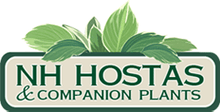Yes, Mulch Does Matter!
For hosta to thrive and reach their full potential they need a constant moisture supply through the growing season and a soil rich in organic matter. Hosta located in dryer soils will grow more slowly, put out fewer leaves and not look as lush especially during the summer months. Location, location, location is all important. But you can improve the location by digging deep and incorporating as much as 50% compost to the soil mix that goes back into the hole. This compost will improve fertility, water retention and provide drainage during heavy rains.
A mulch that is already partially decomposed is also beneficial. Over time this adds more organic matter to the underlying soil. Fresh hard barks or wood chips can be detrimental to hosta if you are not supplementing them with a nitrogen fertilizer. A better mulch for hosta is something like aged Dark Bark, aged manure or more compost. Some of the better garden centers will have bagged product that is a mixture of compost and aged bark. Freshly milled bark ties up nitrogen in the root zone as the soil bacteria begin to work on decomposing the bark.
If you add the proper amounts of organic matter previously described, your hosta will not require a lot of fertilizer. An organic fertilizer such as fish emulsion or processed chicken manure is ideal. Follow the label instructions and all the nutrients will be retained in the soil by the organic matter. If you prepare all your hosta beds this way you will observe that the best growth is obtained in the areas with more moisture. Growing the larger varieties in these areas would be best since they have heavier moisture requirements.
Fertilizing Matters!
A question we get asked often is what fertilizer to use on the hostas. First and foremost we start this answer with amending the soil with compost. Incorporating compost into the holes when planting is the best fertilizer you can start with. That being said, if you want your hostas to grow to the best of their ability, a balanced fertilizer applied each year is key.
As for what kind of fertilizer to use, the answer depends on the kind of gardener you are. If you just want to put a fertilizer down in spring to help the plants and be done with it, then a slow release granular fertilizer is adequate. A common granular fertilizer has an NPK of 10-10-10. Those 3 numbers on a fertilizer bag which stand for Nitrogen, Phosphorus and Potassium. The slow release fertilizers slowly feed every time you water or it rains. They generally last about a month to two months depending on temperatures and how much water is applied. Be sure to keep the granular fertilizer off of the leaves and crown of the hostas as they can burn. That's why it is best to apply this fertilizer before the leaves unfurl.
If you want to get a little fancier and get the best growth out of your hostas, then constantly feeding them through the spring months is key. I like to apply a slow release fertilizer as previously explained but I also like to apply a liquid feed every week to every other week for a quick boost. A liquid feed gives the plants a boost but only lasts 24-48 hours as it is either absorbed by the plants or leaches into the soil. I also like to mix a couple tablespoons of Epsom Salts to my liquid fertilizer.
Epsom salt is made up of "hydrated magnesium sulfate" (magnesium and sulfur), which is important to healthy plant growth. Magnesium allows plants to better take in valuable nutrients, like nitrogen and phosphorus. It also helps in the creation of chlorophyll, which is vital for photosynthesis.
Hostas love magnesium and therefore enjoy a shower of Epsom Salts. It easily dilutes in some warm water and can be mixed with any liquid fertilizer. When fertilizing please read the instructions and DO NOT over feed!
More fertilizer does not necessarily equal bigger plants. It can actually do the reverse and burn the roots and damage if not kill the plants. If you water often then you will need to fertilize often as well because watering leaches the nitrogen away.
